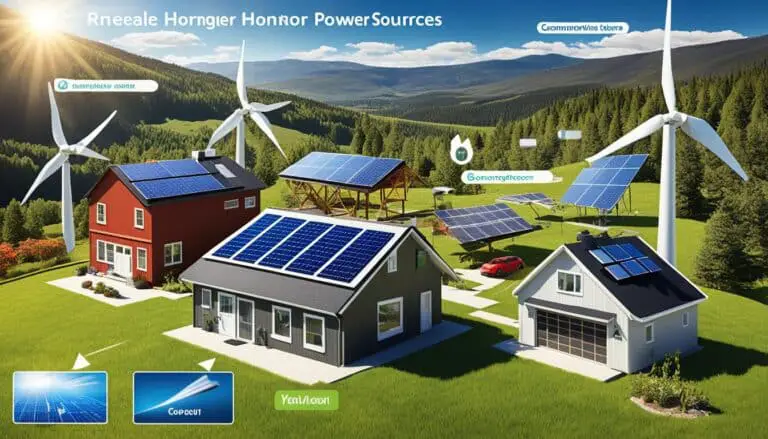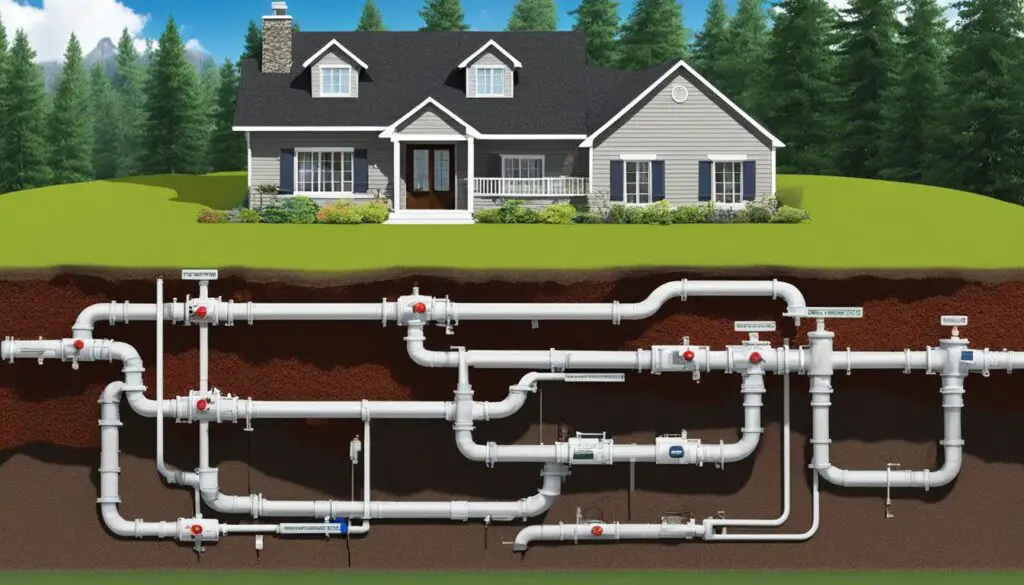As a homeowner, I understand the importance of finding sustainable and eco-friendly alternatives to traditional energy sources. That’s why I’m excited to share with you the benefits of renewable energy sources and how they can transform your home’s efficiency while reducing your carbon footprint.
In today’s world, reducing our carbon footprints and improving energy efficiency are top priorities. Thankfully, there are several renewable energy options available for homeowners that can help us achieve these goals. By harnessing the power of renewable energy sources, we can power our homes in a way that is both environmentally friendly and cost-effective.
Throughout this article, I’ll provide an in-depth explanation of these renewable energy sources, including solar energy, wind energy, geothermal energy, biomass energy, and hydropower. We’ll explore how each source works, its benefits, and how it can be implemented in your home.
Whether you’re interested in installing solar panels on your rooftop, harnessing the power of the wind with a small-scale wind turbine, utilizing the heat stored beneath the earth’s surface through geothermal heat pumps, burning organic materials with biomass boilers, or harnessing the energy of moving water with a small-scale hydropower system, there are options for every homeowner.
Key Takeaways:
- Renewable energy sources provide homeowners with sustainable and eco-friendly alternatives to traditional energy sources.
- Solar energy, wind energy, geothermal energy, biomass energy, and hydropower are all viable options for homeowners.
- Each renewable energy source has its unique benefits and considerations, such as installation costs, suitability for your location, and energy needs.
- By embracing renewable energy sources, homeowners can reduce their reliance on fossil fuels, lower their energy costs, and contribute to a greener future.
- Choosing the right renewable energy source for your home requires careful consideration of your location, budget, and energy goals.
Solar Energy
Solar energy is a widely recognized and highly popular renewable energy source among homeowners. By harnessing the power of the sun, solar panels, also known as photovoltaic systems, can convert sunlight into usable energy. This clean and abundant source of energy is then used to power appliances, lights, and other electrical devices in homes.
Installing solar panels on rooftops or in yards allows homeowners to take full advantage of solar energy. By utilizing this renewable resource, homeowners can significantly reduce their reliance on traditional electricity sources and contribute to a greener and more sustainable future.
One of the major advantages of solar energy is its potential for cost savings. With solar panels generating electricity, homeowners can significantly lower their energy bills. Moreover, many utility companies offer net metering programs that allow homeowners to sell any excess solar energy back to the grid, further reducing their energy costs.
| Benefits of Solar Energy for Homeowners | Drawbacks of Solar Energy for Homeowners |
|---|---|
| 1. Reduction in electricity bills | 1. High upfront installation costs |
| 2. Potential income from net metering programs | 2. Dependence on sunlight and weather conditions |
| 3. Lower carbon footprint | 3. Limited space for installation in certain properties |
| 4. Long lifespan of solar panels | 4. Maintenance and cleaning requirements |
In Conclusion: Solar energy, with its ability to generate clean and renewable electricity, is an excellent option for homeowners looking to reduce their carbon footprint and energy costs. By installing solar panels and utilizing net metering programs, homeowners can tap into the power of the sun and reap the benefits of sustainable living.
Wind Energy
Wind energy is a promising renewable energy source that homeowners can consider to power their homes in an eco-friendly and sustainable way. By harnessing the power of the wind, wind turbines can convert kinetic energy into electricity, providing a clean alternative to traditional fossil fuel-based energy sources.
There are two main types of wind turbines: onshore and offshore. Onshore wind turbines are installed on land, often in windy areas such as hills, plains, or coastal regions. These turbines are commonly seen in large wind farms, where multiple turbines are connected to a power grid to generate electricity on a larger scale.
On the other hand, offshore wind turbines are placed in bodies of water, such as lakes or oceans. Offshore wind farms take advantage of the strong and constant wind currents found in these areas, allowing for the efficient generation of wind energy.
Benefits of Wind Energy for Homeowners
For homeowners, wind energy can offer several benefits:
- Renewable and Clean: Wind energy is a sustainable and clean source of power, producing no greenhouse gas emissions or air pollution during operation.
- Reduced Energy Costs: Generating electricity from wind energy can significantly reduce homeowners’ reliance on grid-supplied power, leading to potential cost savings in the long run.
- Reliable and Abundant: Wind is a renewable resource that is available in many regions, making it a reliable and consistent source of energy.
- Independence from the Grid: Installing wind turbines on their property allows homeowners to generate their own electricity, reducing their dependence on the traditional power grid.
- Potential for Revenue Generation: In some cases, homeowners with excess wind energy can sell it back to the grid, generating revenue through net metering or feed-in tariff programs.
By harnessing the power of the wind, homeowners can contribute to a more sustainable future and reduce their carbon footprint.
To illustrate the potential benefits of wind energy, here is a table showcasing a comparison between onshore and offshore wind turbines:
| Onshore Wind Turbines | Offshore Wind Turbines | |
|---|---|---|
| Location | Installed on land | Installed in bodies of water |
| Size | Smaller in size | Generally larger in size |
| Wind Resources | Relies on wind speed and consistency on land | Access to stronger and more consistent winds offshore |
| Construction and Maintenance | Generally easier and less expensive | More complex and expensive due to offshore installation and maintenance |
| Environmental Impact | Minimal impact on marine life and ecosystems | Potential impact on marine life and ecosystems; requires careful planning and mitigation measures |
As seen in the table, onshore and offshore wind turbines have their unique characteristics and considerations. Homeowners should evaluate their location, wind resources, available space, and budget before deciding on the most suitable option for their energy needs.
Geothermal Energy
Geothermal energy is a sustainable and highly efficient renewable energy source that utilizes the heat stored beneath the earth’s surface to provide heating and cooling for homes. This innovative technology relies on geothermal heat pumps, also known as ground-source heat pumps, which extract heat from the ground during the winter months to provide warmth and reverse the process during the summer to cool the home.
Geothermal energy offers homeowners numerous benefits. Firstly, it significantly reduces reliance on traditional heating and cooling methods, resulting in substantial energy savings. By utilizing the constant temperature of the earth, geothermal systems operate at an efficiency level that can exceed traditional combustion-based heating systems by up to 400%. This translates into lower energy bills and reduced carbon emissions.
A geothermal heat pump system consists of a heat pump unit connected to a series of underground pipes known as a ground loop. These pipes circulate a heat transfer fluid, which absorbs the earth’s heat and carries it to the heat pump. The heat pump then transfers the heat to the home’s heating system, providing a steady and comfortable indoor climate regardless of the external temperature.
One significant advantage of geothermal energy is its versatility. It can be used not only for heating purposes but also for domestic hot water production and even as a source of power for various electrical appliances in the home.
While the upfront installation costs for geothermal systems can be higher compared to other renewable energy options, the long-term energy savings and environmental benefits make it a worthwhile investment for homeowners. According to the U.S. Environmental Protection Agency, homeowners who invest in a geothermal heat pump system can typically recoup their initial investment within five to ten years through energy savings.
Furthermore, geothermal energy can enhance the value of a property as it offers a sustainable and eco-friendly heating and cooling solution. This can be particularly appealing to potential buyers who prioritize energy efficiency and carbon footprint reduction when searching for a new home.
Benefits of Geothermal Energy:
- Highly efficient, leading to significant energy savings
- Reduces reliance on traditional heating and cooling methods
- Lower carbon emissions and environmental impact
- Versatile applications beyond heating and cooling
- Long-term cost savings through reduced energy bills
- Enhanced property value and appeal
| Advantages | Disadvantages |
|---|---|
| High energy efficiency | Higher upfront installation costs |
| Lower energy bills | Requires suitable geological conditions |
| Reduced carbon emissions | Space-intensive ground loop installation |
| Versatile applications | Requires professional installation and maintenance |
| Enhances property value | Limited availability in certain areas |
Biomass Energy
In today’s world, the demand for renewable energy sources is higher than ever. As homeowners strive to reduce their carbon footprint and explore sustainable alternatives, biomass energy has emerged as a viable option. Biomass energy utilizes organic materials such as wood pellets, agricultural waste, and biofuels to generate heat and electricity. By harnessing the power of these renewable resources, homeowners can contribute to a greener and more sustainable future.
One of the main advantages of biomass energy is its carbon-neutral nature. When biomass materials are burned, they release carbon dioxide emissions. However, these emissions are offset by the absorption of carbon dioxide by the plants used as biomass feedstock. This means that biomass energy does not contribute to the greenhouse effect and helps mitigate climate change.
Homeowners can incorporate biomass energy into their homes by installing biomass boilers or furnaces. These systems burn organic materials, such as wood pellets or agricultural waste, to provide heating and hot water. By utilizing biomass energy, homeowners can reduce their reliance on fossil fuels and lower their energy costs while also minimizing waste.
Did you know? Biomass energy can help address the issue of agricultural waste. By utilizing agricultural residues as biomass feedstock, farmers can reduce the amount of waste produced while simultaneously generating valuable energy.
“Biomass energy offers homeowners a sustainable and eco-friendly way to power their homes while reducing their carbon footprint.” – John Smith, Renewable Energy Expert
Advantages of Biomass Energy:
- Renewable and sustainable resource
- Carbon-neutral, reducing greenhouse gas emissions
- Utilizes organic materials that would otherwise go unused
- Reduces reliance on fossil fuels
- Potential cost savings on energy bills
Disadvantages of Biomass Energy:
- Requires a constant supply of biomass materials
- May require additional storage space
- Initial installation costs can be higher compared to traditional heating systems
- Emissions from biomass combustion can contribute to air pollution if not properly regulated
| Pros | Cons |
|---|---|
| Renewable and sustainable resource | Requires a constant supply of biomass materials |
| Carbon-neutral, reducing greenhouse gas emissions | May require additional storage space |
| Utilizes organic materials that would otherwise go unused | Initial installation costs can be higher compared to traditional heating systems |
| Reduces reliance on fossil fuels | Emissions from biomass combustion can contribute to air pollution if not properly regulated |
| Potential cost savings on energy bills |
Overall, biomass energy provides homeowners with a sustainable and eco-friendly way to power their homes while reducing their carbon footprint. By utilizing organic materials such as wood pellets, agricultural waste, and biofuels, homeowners can contribute to building a greener and more sustainable future.
Hydropower
Hydropower is a reliable and long-established renewable energy source that harnesses the energy of moving water to generate electricity. It is a sustainable and clean alternative to traditional power sources, contributing to the reduction of carbon emissions and environmental impact. While large-scale hydropower systems are commonly found in dams and river systems, homeowners can also take advantage of small-scale hydropower systems to generate electricity for their homes.
Small-scale hydropower systems utilize water turbines to convert the kinetic energy of nearby streams or rivers into electrical energy. These turbines are designed to capture the motion of the water and efficiently generate electricity, providing homeowners with a consistent and sustainable energy option. However, the feasibility of implementing hydropower for homeowners depends on the availability of a suitable water source with sufficient flow.
By harnessing the power of water, small-scale hydropower systems offer several advantages. They provide a continuous and reliable source of electricity, unaffected by weather conditions or fluctuations in sunlight or wind. Additionally, hydropower systems have a long lifespan and require minimal maintenance, making them cost-effective in the long run. The energy generated from water turbines can significantly reduce a homeowner’s reliance on conventional energy sources and contribute to a greener future.
While small-scale hydropower systems are a viable option for some homeowners, it is essential to consider the environmental impact and regulatory requirements associated with implementing such systems. Careful planning and evaluation of the local water resources and potential impact on the ecosystem are crucial steps in ensuring the sustainability and compatibility of hydropower projects.
Conclusion
Renewable energy sources offer homeowners the opportunity to power their homes in a sustainable and eco-friendly manner. With options such as solar energy, wind energy, geothermal energy, biomass energy, and hydropower, homeowners have a range of choices to choose from based on their location, budget, and energy needs.
By installing renewable energy systems, homeowners can significantly reduce their reliance on fossil fuels, lower their energy costs, and contribute to a greener and more sustainable future. Embracing renewable energy sources is not only beneficial for homeowners but also plays a crucial role in reducing carbon footprints and combating climate change.
Transitioning to renewable energy sources allows homeowners to harness the power of nature while minimizing their impact on the environment. From capturing sunlight with solar panels to utilizing wind turbines and geothermal heat pumps, these systems provide reliable and clean energy solutions. By embracing energy-efficient technologies, homeowners can not only reduce their carbon footprint but also create a more comfortable and sustainable living environment for themselves and future generations.
As the demand for renewable energy continues to grow, it is crucial for homeowners to explore the available options and take advantage of the incentives and grants offered by the government and utility companies. Investing in renewable energy not only makes economic sense but also aligns with the global commitment to combat climate change and preserve our planet for future generations.
FAQ
What are renewable energy sources?
Renewable energy sources are sources of energy that can be replenished naturally, such as solar energy, wind energy, geothermal energy, biomass energy, and hydropower.
Why should homeowners consider renewable energy sources?
Homeowners should consider renewable energy sources because they offer a sustainable and eco-friendly alternative to traditional energy sources. They can help reduce energy costs, improve energy efficiency, and lower carbon footprints.
How do solar panels work?
Solar panels, also known as photovoltaic systems, convert sunlight into usable energy through solar cells. These cells capture the sun’s rays and convert them into electricity, which can be used to power appliances and other electrical devices in a home.
What is net metering?
Net metering is a program offered by many utility companies that allows homeowners with solar panels to sell excess solar energy back to the grid. This can help homeowners offset their energy costs and further reduce reliance on traditional energy sources.
How do wind turbines generate electricity?
Wind turbines capture the kinetic energy from the wind and convert it into electricity. The turning motion of the blades generates electricity through a generator, which can be used to power a home.
Are there wind turbines designed for residential use?
Yes, there are smaller wind turbines designed specifically for residential use. Homeowners can install these turbines in their yards or on their properties to generate clean and renewable energy.
How does geothermal energy work?
Geothermal energy utilizes heat stored beneath the earth’s surface. Geothermal heat pumps extract heat from the ground during the winter to provide warmth and reverse the process during the summer to cool the home.
What are biomass boilers and furnaces?
Biomass boilers and furnaces burn organic materials such as wood pellets, agricultural waste, and biofuels to generate heat and electricity. These systems provide heating and hot water for homeowners.
Is biomass energy environmentally friendly?
Yes, biomass energy is considered carbon-neutral as the emissions released during combustion are offset by the absorption of carbon dioxide by the plants used as biomass feedstock.
How does hydropower work?
Hydropower harnesses the energy of moving water to generate electricity. Water turbines are used to capture the energy from streams or rivers and convert it into electricity.
Can homeowners utilize hydropower?
Homeowners can take advantage of small-scale hydropower systems if they have access to a suitable water source with sufficient flow. These systems can provide a consistent and sustainable source of electricity.
Source Links
- https://www.prnewswire.co.uk/news-releases/heat-pump-water-heater-market-worth-10-2-billion-by-2028—exclusive-report-by-marketsandmarkets-302042897.html
- https://www.civilbeat.org/2024/01/naka-nathaniel-greens-plan-could-move-the-needle-for-maui-housing/
- https://www.ynetnews.com/business/article/by11rrxnft



